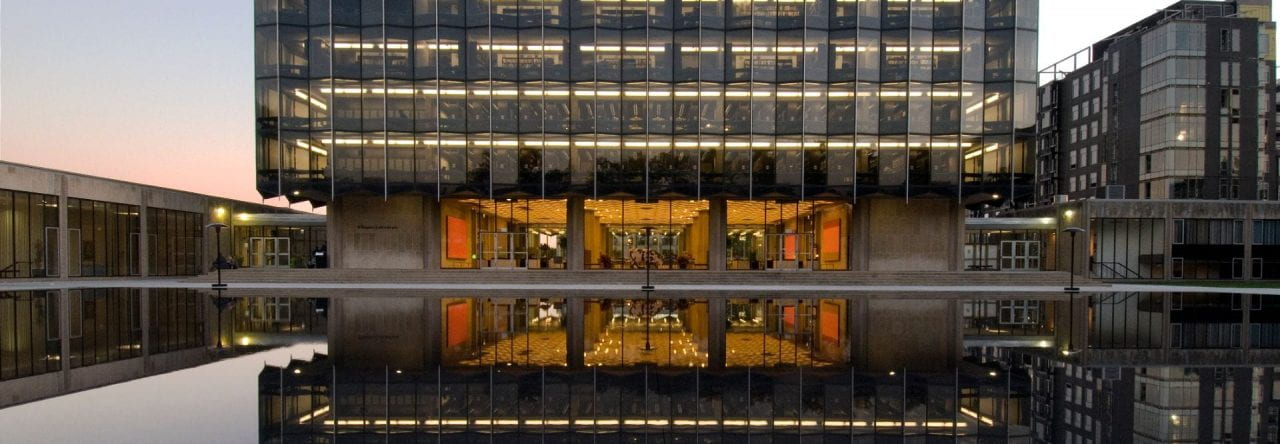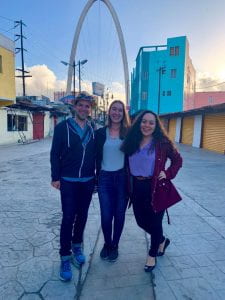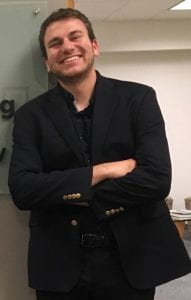During Spring Break 2019, three University of Chicago law students traveled to Tijuana to assist asylum seekers at the U.S. – Mexico border.
By Morgan Daves-Gehrls, ’20
Over Spring Break in 2019, Jacob Hamburger, ’21, Anna Porter, ’20, and Mariah Garcia, ’19 travelled to Tijuana, Mexico to lend their support to migrants seeking asylum in the United States. The trip was co-sponsored by National Lawyers Guild and the International Refugee Assistance Project. “We were working with Al Otro Lado, a group that does daily border monitoring and know your rights presentations in Tijuana for those about to cross into the United States and seek asylum,” explains Garcia. The three volunteers helped with Al Otro Lado’s daily workshops, which inform asylum-seekers about the asylum process. They also helped conduct legal intake interviews, which allow volunteer attorneys to give advice to those seeking asylum. “The organization tries to help people think about how to tell their story in a way that is accessible to an officer conducting a credible fear interview, which is the first step in the asylum process,” explains Porter. In addition to these legal tasks, the volunteers also helped with routine work needed for the project, like cleaning, preparing food, and babysitting. The project operates out of a borrowed community center in downtown Tijuana.
Al Otro Lado also does legal observations, where lawyers and law student volunteers observe the actions of United States and Mexico border officials to assess their compliance with international and domestic law. It was during one of these legal observations that Garcia was most impacted. Al Otro Lado volunteers were observing “La Lista,” a process in which asylum seekers gather in a plaza, sign up for the United States’ tedious numbering system, and wait to hear the numbers called for those who will be interviewed that day. Mexican government officials removed all migrants from African countries (in this case, Cameroon), alleging that their papers were out of date. The volunteers later learned that this is a well-known racist tactic that these Cameroonian individuals had experienced many times at other Latin American border crossings. Al Otro Lado volunteers tried to intervene, but were met with hostility from border officials. Garcia explains, “they even attempted to claim our simple act of standing near the border crossing was illegal, which is false, and threatened to deport several volunteers. This is apparently a frequent threat that volunteers with Al Otro Lado face.”
Like Garcia, Hamburger was deeply moved by what he experienced while volunteering. After hearing of highly traumatic events in migrants’ past, Hamburger saw the terrible experience they had while trying to navigate the asylum process. “Regardless of how clearly someone meets the criteria for asylum, they still have to endure arbitrary waiting periods in Tijuana,” said Hamburger. Migrants are also “subjected to inhumane conditions, family separation, and long detention at the hands of our own government. Seeing this up close is something I’ll never forget.”
Although their week of service illuminated the plight of asylum seekers at the border, the sense of cooperation among asylum-seekers provided a bit of optimism. “One thing that struck me was the information sharing between the asylum seekers, some of whom had crossed and been returned under the Remain in Mexico program,” explains Porter. “Although the information they are sharing is often scary, it can be powerful. I saw a lot of solidarity between everyone crossing, which often reflects the journey many of them have had to travel to get to Tijuana. It can be dangerous, and the asylum seekers often look out for one another.”
These three volunteers pursued a broad range of professional opportunities after their service in Tijuana, but each is committed to serving those in need. Hamburger worked at Larry Krasner’s District Attorney’s Office over the summer, in addition to Community Activism Law Alliance (now Beyond Legal Aid), which works extensively with immigrant community groups. Over the summer, Porter worked at Katten in Chicago, working on a pro bono project with the Domestic Violence Legal Clinic. She also worked in the Young Center for Immigrant Children’s Rights over her 2L year, and has continued to work in a volunteer capacity. Garcia is now a Justice Fellow at Loevy & Loevy, a firm that focuses on police brutality, wrongful conviction and prison litigation, and hopes to continue pro bono immigration work.



